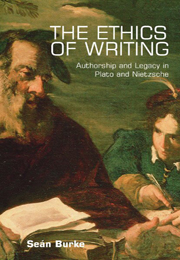Book contents
- Frontmatter
- Contents
- Acknowledgements
- Key to References and Abbreviations
- Prologue: Friedrich Nietzsche in Auschwitz, or the Posthumous Return of the Author
- Introduction: The Responsibilities of the Writer
- Chapter 1 The Ethical Opening
- Chapter 2 The Ethics of Legacy
- Chapter 3 Signature and Authorship in the Phaedrus
- Chapter 4 The Textual Estate: Nietzsche and Authorial Responsibility
- Conclusion: Creativity versus Containment: The Aesthetic Defence
- Bibliography
- Index
Chapter 4 - The Textual Estate: Nietzsche and Authorial Responsibility
Published online by Cambridge University Press: 12 September 2012
- Frontmatter
- Contents
- Acknowledgements
- Key to References and Abbreviations
- Prologue: Friedrich Nietzsche in Auschwitz, or the Posthumous Return of the Author
- Introduction: The Responsibilities of the Writer
- Chapter 1 The Ethical Opening
- Chapter 2 The Ethics of Legacy
- Chapter 3 Signature and Authorship in the Phaedrus
- Chapter 4 The Textual Estate: Nietzsche and Authorial Responsibility
- Conclusion: Creativity versus Containment: The Aesthetic Defence
- Bibliography
- Index
Summary
one will guess why I bring out this book beforehand; it is intended to prevent people making mischief with me [dass man Unfug mit mir treibt].
(Ecce Homo, 96)mischief, thou art afoot
Take thou what course thou wilt!
(Julius Caesar III.ii)Ecce Homo is the strange summation of the strangest oeuvre in modernity. Not looking back from any vantage of supposed or assumed maturity, it inscribes itself within an unfolding project. The text heralds the work, not only that of the promised revaluation but the corpus, the textual phenomenon that is ‘Nietzsche’ seen sub specie futuris. That the work has not been read is due, Nietzsche contends, to ‘the disparity between the greatness of [his] task and the smallness of [his] contemporaries’ (EH, 3). Nor indeed could those texts have been read if one sees writing as potentia to be realised on the plane of history. History itself awaits ‘Nietzsche’. For all its Christian connotations, Nietzsche's posthumous birth is a trope for an overwhelming concern with legacy. Perhaps impelled by a sense that his creative life was drawing to a close, or by the painful realisation that he was unequal to the grandiloquent project of ‘the revaluation of all values’, Nietzsche purports to teach us how to read his work.
The supposed revaluation is presented as self-revelation: ‘it seems indispensable to me to say who I am’ (EH, 3); ‘the self-overcoming of morality through truthfulness; the self-overcoming of the moralist, into his opposite – into me’ (EH, 98).
- Type
- Chapter
- Information
- The Ethics of WritingAuthorship and Legacy in Plato and Nietzsche, pp. 192 - 221Publisher: Edinburgh University PressPrint publication year: 2008



